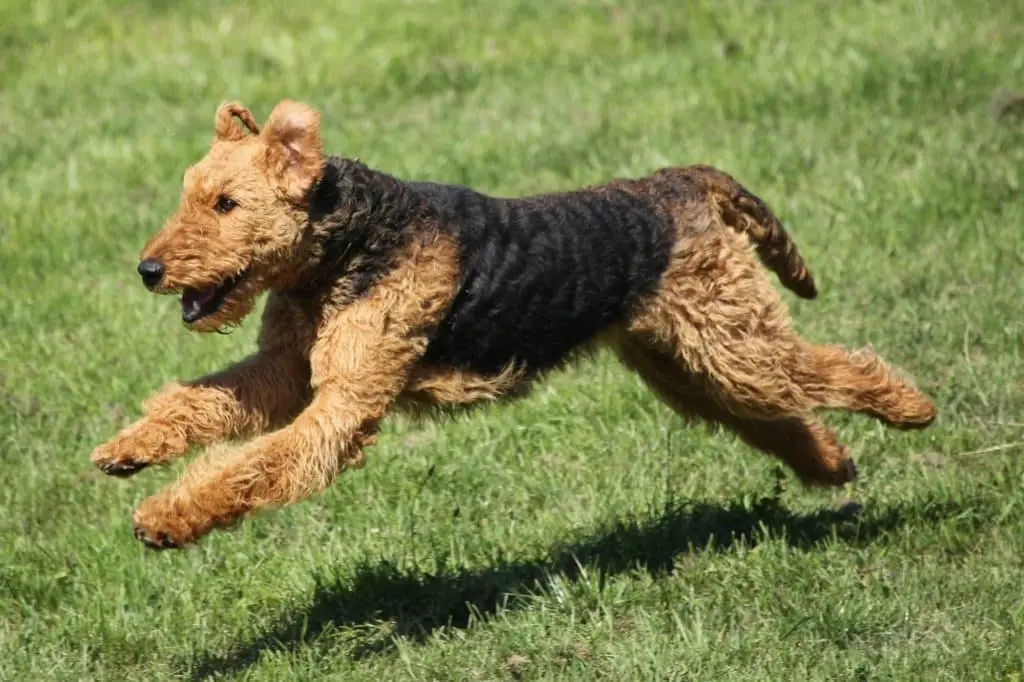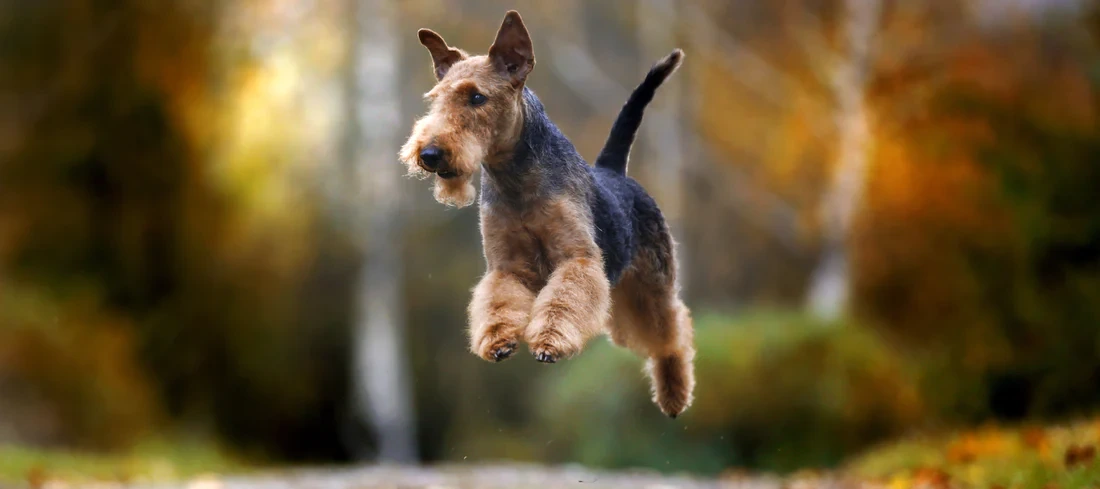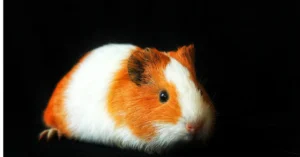History
The Airedale Terrier, often referred to as the “King of Terriers,” has a fascinating history that traces its roots to the Aire Valley in West Yorkshire, England. This breed is a product of careful breeding and the melding of several terrier and hound breeds, resulting in a versatile and talented working dog.
The story of the Airedale Terrier’s development begins in the early 19th century. In this region, a breed known as the Black and Tan Terrier, which is now extinct, was commonly used for hunting otters and rats in the Aire Valley. This terrier, likely a precursor to the Airedale, was a gritty and skilled hunter. At the same time, a breed called the Waterside Terrier was used for hunting waterfowl.

In the mid-19th century, breeders decided to cross these two terrier breeds to create a dog that excelled in both land and water hunting. The result of this selective breeding was the Airedale Terrier, a versatile and robust dog with a distinctive black and tan coat.
The Airedale Terrier quickly gained popularity in the Aire Valley for its hunting prowess, becoming a favorite among gamekeepers and sportsmen. Its hunting abilities extended beyond otters and rats to larger game like foxes and badgers. Additionally, it was an excellent water dog, retrieving game from rivers and lakes.
The breed’s talents didn’t go unnoticed beyond the Aire Valley. Airedales were exported to the United States, where they were recognized as a valuable addition to hunting and sporting activities. Their intelligence and versatility made them a preferred choice for a range of roles, including as police dogs and military service dogs during World War I.
In the late 19th and early 20th centuries, Airedale Terriers also found their place as family pets and companions. Their affectionate and loyal nature, combined with their intelligence and protective instincts, made them beloved members of households.
Today, the Airedale Terrier continues to be a popular breed, appreciated for its versatility, intelligence, and friendly disposition. While its hunting days may be less frequent, it excels in various roles, from family pet to therapy dog to a skilled show dog. Its rich history as a working dog in the Aire Valley serves as a testament to its adaptability and enduring appeal
Airedale Terrier Size
The Airedale Terrier, often referred to as the “King of Terriers,” is a medium to large-sized breed of dog known for its distinctive appearance and versatile abilities. When discussing the size of Airedale Terriers, it’s essential to consider various aspects of their physical characteristics.

Height: A typical adult Airedale Terrier stands at a height of around 21 to 23 inches (53 to 58 centimeters) at the shoulder. Males tend to be slightly larger than females, with an average height of 23 inches, while females typically measure around 21 to 22 inches.
Weight: The weight of an adult Airedale Terrier typically ranges from 40 to 65 pounds (18 to 29 kilograms). Again, males tend to be on the heavier end of this spectrum, while females are generally lighter.
Proportions: Airedale Terriers are well-proportioned dogs with a strong, muscular build. They have a deep chest, a straight back, and a level topline, which gives them a balanced appearance. Their legs are straight and sturdy, and they carry themselves with an air of confidence.
Coat: Airedales have a dense, wiry, and water-resistant double coat that consists of a soft undercoat and a harsh, bristly topcoat. Their distinctive coat contributes to their unique appearance, making them stand out among terrier breeds.
Color: The standard color for Airedale Terriers is a tan body with a black saddle. The saddle extends from the back of the neck to the base of the tail. They also have a darker-colored head with a black mask and ears. Their legs are tan, and their tail is typically docked to a certain length.
Overall Appearance: Airedales are known for their alert and intelligent expression, which is accentuated by their dark, expressive eyes. They have a strong, square-shaped head, a well-defined stop (the point where the forehead meets the nose), and a black nose. Their ears are V-shaped and fold slightly forward, giving them a keen and attentive appearance.
Nutrition and Diets
Proper nutrition is vital for the health and well-being of Airedale Terriers, a breed known for its energy and intelligence. A well-balanced diet ensures they have the necessary nutrients to support their active lifestyle and maintain a healthy weight.

1. High-Quality Commercial Dog Food:
The foundation of an Airedale Terrier’s diet should be high-quality commercial dog food. Look for dog foods that list meat, poultry, or fish as the primary ingredient. These foods provide essential proteins and amino acids necessary for muscle development and overall health.
2. Breed-Specific Dog Food:
Some dog food brands offer breed-specific formulas, which can be beneficial for Airedale Terriers. These formulas are often tailored to meet the specific nutritional needs and potential health concerns of the breed. They may contain ingredients like glucosamine and chondroitin to support joint health, which is important for this active breed.
3. Avoid Fillers and By-Products:
When selecting commercial dog food, avoid brands that contain excessive fillers like corn, wheat, and soy. These ingredients offer little nutritional value and can lead to digestive issues. Additionally, steer clear of dog foods with artificial additives and by-products, as they may not provide the necessary nutrients
4. Portion Control:
Maintaining an ideal weight is crucial for Airedale Terriers to prevent obesity, which can lead to various health problems. Portion control is essential, and you should follow the recommended feeding guidelines provided on the dog food packaging. Monitor your dog’s weight and adjust portions as needed.
5. Fresh Water:
Ensure your Airedale Terrier has access to clean and fresh water at all times. Proper hydration is essential for digestion and overall health.
6. Home-Cooked Meals:
Some dog owners prefer to prepare home-cooked meals for their Airedale Terriers. If you choose this route, it’s essential to consult with a veterinarian or canine nutritionist to ensure you’re providing a balanced diet. Homemade diets should include a mix of lean protein sources, vegetables, and grains. Be cautious of providing adequate vitamins and minerals, including calcium and phosphorus ratios, which are vital for bone health.
7. Treats and Snacks:
Treats can be an effective tool for training and bonding with your Airedale Terrier. However, they should be given in moderation and should not exceed 10% of their daily caloric intake. Opt for healthy treats like small pieces of fruits or vegetables or commercially available dog treats designed for training.
8. Age-Specific Diets:
As Airedale Terriers age, their nutritional needs may change. Puppies require diets that support growth and development, including higher protein and calorie content. Adult dogs need a balanced diet to maintain their energy levels, while senior dogs may benefit from foods with lower calorie content to prevent weight gain.
9. Health Considerations:
If your Airedale Terrier has specific health issues, such as allergies or food sensitivities, work with your veterinarian to select an appropriate diet. Specialized diets are available to address various health concerns, including skin issues, joint problems, and gastrointestinal disorders.
Training and Intelligence
Training Airedale Terriers can be both rewarding and challenging due to their intelligence and independent nature. Here are some key points to consider when training this breed:

- Start Early: Begin training your Airedale Terrier puppy as soon as you bring them home. Early socialization and basic obedience training are crucial to shaping their behavior.
- Positive Reinforcement: Airedales respond best to positive reinforcement techniques such as praise, treats, and toys. Reward-based training encourages them to repeat desired behaviors.
- Consistency: Be consistent with your commands and expectations. Airedales can become confused if the rules are not clear and consistent.
- Firm Leadership: Airedales are strong-willed dogs, so they require a confident and assertive leader. Establish yourself as the pack leader without resorting to harsh punishment.
- Obedience Classes: Consider enrolling your Airedale Terrier in obedience classes, especially if you’re a first-time dog owner. Professional trainers can help you address specific behavioral issues and provide guidance.
- Socialization: Expose your Airedale to various people, animals, and environments from a young age. Proper socialization reduces the risk of aggression or fearfulness.
- Exercise and Mental Stimulation: Airedales are highly active and intelligent dogs. Regular exercise and mental stimulation through puzzles and interactive toys are essential to prevent boredom-related behavioral problems.
- Patience: Airedales can be stubborn at times, so patience is key. Avoid becoming frustrated and maintain a calm demeanor during training sessions.
- Barking Control: Airedales are known for their vocal nature. Teach them the “quiet” command early to manage excessive barking.
- Advanced Training: Airedales excel in various dog sports and activities, including agility, obedience trials, and scent work. Consider advanced training if your Airedale has mastered basic commands.
Remember that each Airedale Terrier is unique, and training should be tailored to their individual temperament and needs. With the right approach and consistency, Airedales can become well-behaved and obedient companions.
Intelligence of Airedale Terriers:
Airedale Terriers are highly intelligent dogs known for their problem-solving abilities and quick thinking. Here are some insights into their intelligence:
- Versatile Problem Solvers: Airedales have a natural inclination to solve problems. They are resourceful and can figure out how to access food, toys, or escape from confined spaces.
- Independent Thinkers: While their intelligence is an asset, Airedales can also be independent thinkers. They may choose to follow commands if they see a clear reason to do so, making training a matter of motivation.
- Adaptability: Airedales are adaptable and can thrive in various environments and roles. They have served as working dogs in roles such as hunting, search and rescue, and even as police dogs.
- Quick Learners: Airedales are fast learners and can pick up new commands and tasks relatively quickly. This trait makes them suitable for advanced training and various dog sports.
- Sensitivity: Despite their intelligence, Airedales are sensitive to their owners’ emotions. They can detect changes in your mood and respond accordingly, often offering comfort and companionship.
- Problem-Solving Challenges: To keep their minds engaged, provide Airedales with puzzle toys and challenging activities. This prevents boredom, which can lead to destructive behavior.
- Strong Work Ethic: Airedales possess a strong work ethic, stemming from their history as hunting dogs. They are willing to put in the effort to accomplish tasks.
- Curiosity: Airedales are naturally curious, which can sometimes get them into mischief. However, their curiosity can also be channeled positively into activities like tracking or scent work.
- Alertness: Airedales are alert and make excellent watchdogs. Their intelligence allows them to assess situations quickly and respond with appropriate protective behavior.
- Problem-Solving in Play: Airedales often engage in problem-solving play, such as figuring out how to retrieve a toy from under furniture or navigate obstacle courses. This keeps them mentally stimulated and entertained.
Health and Lifespan
The Airedale Terrier, known for its intelligence, loyalty, and versatility, is generally a healthy breed. However, like all dog breeds, they can be susceptible to certain health issues. Responsible breeding practices and routine veterinary care are essential to ensure the well-being of Airedales.

- Hip Dysplasia: This condition involves an improper development of the hip joint, leading to pain, lameness, and arthritis. Airedale Terriers can be prone to hip dysplasia, and responsible breeders often screen their breeding dogs for this condition.
- Elbow Dysplasia: Elbow dysplasia is a similar joint condition that affects the elbow joint. It can cause discomfort and lameness. Regular veterinary check-ups can help diagnose and manage this issue.
- Bloat (Gastric Dilatation-Volvulus): Airedales, like many deep-chested breeds, can be at risk for bloat, which is a life-threatening condition where the stomach fills with gas and may twist. Immediate veterinary attention is crucial if bloat is suspected.
- Hypothyroidism: Some Airedale Terriers can develop hypothyroidism, a condition where the thyroid gland doesn’t produce enough hormones. This can lead to weight gain, lethargy, and skin issues. It is usually treatable with medication.
- Skin Allergies: Airedales may be prone to skin allergies, which can cause itching, rashes, and discomfort. Identifying and managing allergens through diet and medication can help alleviate these issues.
- Cancer: Cancer can affect dogs of any breed, and Airedales are no exception. Regular veterinary check-ups and early detection are essential for managing cancer if it does occur.
- Progressive Retinal Atrophy (PRA): This is a genetic condition that can lead to vision loss and blindness. Responsible breeders often test their breeding dogs for the PRA gene to reduce the risk of passing it on to offspring.
- Ear Infections: Airedales have floppy ears that can be prone to infections, especially if not kept clean and dry. Regular ear cleaning can help prevent this issue.
- Obesity: Airedales enjoy eating, and without proper portion control and exercise, they can become overweight. Obesity can lead to various health problems, so maintaining a healthy weight is crucial.
- Regular Vet Check-ups: Routine veterinary visits are essential to monitor your Airedale Terrier’s overall health, administer vaccinations, and catch potential health issues early.
Lifespan of Airedale Terriers:
The Airedale Terrier is known for its relatively long lifespan compared to some other dog breeds. On average, Airedales can live for 10 to 13 years, although some may reach even older ages with proper care.
Several factors contribute to the Airedale Terrier’s longevity:

- Genetics: Responsible breeding practices play a significant role in the health and lifespan of Airedales. Ethical breeders screen for genetic disorders to reduce the risk of passing on hereditary health problems.
- Diet and Exercise: A balanced diet and regular exercise are essential for maintaining a healthy weight and overall well-being. Airedales thrive on physical activity and mental stimulation.
- Veterinary Care: Routine veterinary check-ups, vaccinations, and preventive care are crucial for detecting and addressing health issues early.
- Dental Care: Dental health is often overlooked but can impact a dog’s overall health. Regular teeth cleaning and dental care can prevent oral problems that may affect longevity.
- Emotional Well-being: Airedale Terriers are social dogs that thrive on companionship and interaction with their human family members. Providing love and mental stimulation contributes to their happiness and overall quality of life.
- Quality of Life: Ensuring your Airedale’s physical and emotional needs are met contributes to a longer, happier life. Providing a safe and stimulating environment and addressing any health issues promptly are key components of their well-being.
Conclusion
In conclusion, Airedale Terrier dogs are a remarkable breed with a rich history, medium to large size, specific dietary needs, high intelligence, and a propensity for loyalty. They have been versatile working dogs, excelling in various roles throughout history. Proper care, including a balanced diet, regular training, and veterinary attention, is essential to ensure they lead healthy and fulfilling lives. Airedales make excellent companions for families and individuals alike, thanks to their charming personality and adaptability. With the right care and love, these “King of Terriers” can be cherished members of your household for many years to come.



